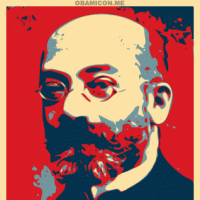Mesaĝoj: 146
Lingvo: English
Tidalias (Montri la profilon) 2008-septembro-17 05:08:25
Karny: Hah, I'll see what I can do.

Well, I got ten pages done today and may as well post that much. Have a look!
Included in the zip are the first ten pages in English and my attempts in Esperanto. Feel free to point out translation flaws, or offer moral support to keep me going.

www.yourfavoritewebsite.com/eoYotsubato1-10.zip
trojo (Montri la profilon) 2008-septembro-17 16:16:00
Pg 2
I think "blindiga" is too literal a translation of "dazzling" (which is really a figure of speech). I would just use "brilanta". The Lernu dictionary has "blindumi" for dazzle (so "blindumanta" would be dazzling), but I haven't heard that word before.
Also, I don't like the Comic Sans font, though I guess that's a personal preference. There are much better-looking (and free) comic-book style fonts out there.
Pg 4
"Ni preskaŭ alvenos" seems a little strange. If you want to use "alvenos", I would say "Ni baldaŭ alvenos tien" (the "tien" is optional). If you want to use "preskaŭ", I would say "Ni estas preskaŭ tie" (a more literal translation). "Almost will arrive" seems to say that you aren't quite going to make it.
I don't know how widespread the use of "mojosa" is. Personally, I think that word is all kinds of dorky. In any event, whatever word you use for "Awesome!" in that speech bubble has to be formed as an adverb. So, "bonege!" (or "mojose!" if you must) or whatever.
Say "multe da domoj" (lots of houses) or "multaj domoj" (many houses). "Multe domoj" isn't correct because an adverb can't directly modify a noun.
Pg 5
"Speaking of which" should simply be "Parolante pri tio," (with comma).
Pg 6
I would prefer "mansvingi" over "mansigni". I think of "mansigni" as giving hand signs and "mansvingi" as just waving.
I would probably say "etendiĝu" instead of "ekeliru" here.
"Ĝi estas danĝera" should be "tio estas danĝera". "Ĝi" customarily refers to something concrete, so "ne etendiĝu tra la fenestro; ĝi estas danĝera" seems to be saying that the window is dangerous, which isn't what is meant. PMEG explains this usage point much better than I could.
Pg 7
"Jen" instead of "rigardu". We don't really have an equivalent in English for "jen", but it's used to call attention to something.
"Kion vi celas diri per 'kie'?" instead of "Kio vi signifas 'kie'?". Signifi isn't usually used to mean "mean" in the sense of "intend". Also, don't forget the accusative. If that's too long, maybe "Kial vi demandis 'kie'?"
I would use "jen Jumbo" instead of "estas Jumbo".
Pg 8
I've always thought "long time no see" is kind of a strange turn of speech; I wonder what the original Japanese says here. Anyway, I would translate this "tro longe sen revido".
Pg 9
"Kiel vi fartas?"
"Ĉesu" instead of "haltu". "Ĉesi" refers to an action, "halti" to motion.
More later...
Tidalias (Montri la profilon) 2008-septembro-17 16:30:47
Awesome corrections, trojo, thank you very much for taking the time to write and explain them! I follow them, and will include the necessary revisions in the next batch of pages.
Though, on page 9, where I only used "Kiel vi?", I found a site elsewhere which said that was the more informal way of asking it, and figured the English there sounded pretty informal, so. Is it not a very common truncation to use?
For mojose, I figure she's the type of character that would readily use an "all kinds of dorky" word and not realize it or care.

As for Comic Sans, it's my duty as an art student to loathe it, but I searched dafont.com for some time, trying to find a suitable font, and none of them would support the particular accented characters that E-o incorporates. I'll try to find one, though, since I know the stigma that the font holds with most.
Thank you much, again.
Frakseno (Montri la profilon) 2008-septembro-17 18:37:56
Frakseno (Montri la profilon) 2008-septembro-17 18:45:28
Also, I'll take a look at the comic book letter fonts I have to see if any of them incorporate the circumflex characters. If so, I'll forward to you.
trojo (Montri la profilon) 2008-septembro-17 18:46:10
Anyway, more from page 9
"...ol kiam mi laste vidis vin, Jumbo"
"Ha" instead of "Hah"
I would use "tiun frazon" (or maybe just "tion" by itself) instead of "ĉi tio lokucion". The difference between "tio" and "tiu" is that "tio" is a noun and so can't modify another noun, while "tiu" is considered an adjective, even when the noun it modifies is left out. I think of "lokucio" as more of a technical grammar term.
"Jumbo devos labori kvazaŭ du homoj." He's not literally able to be two people, right? I guess you never know with comics...
I would say "Nepre ne!" instead of "Malebla!" If you don't like "nepre ne", then you should use "Neeble!" (note adverb form) or "Ne eblas!" Ne- instead of mal- because it's something that's not possible, as opposed to something that's anti-possible, which I don't even know what that would mean.
"En kiel maniero" should be either "tiamaniere" or simply "tiel" (mi ne tiel laboros). Tiel and tiamaniere both mean the same thing, more or less. The -iel correlatives can't modify nouns because they are all adverbs.
"Tio bonegas" instead of "ĝi estas bonega".
I don't know if "dependi" is the best word here for "rely". I would use "konfidi". Ni ne povas konfidi al Paĉjo.
You are right about fonts not having special characters. Arial and Monotype Corsiva have them though. I'm not crazy about Corsiva but it beats the heck out of Comic Sans. Corsiva might be okay for the narrator "voiceovers".
Tidalias (Montri la profilon) 2008-septembro-17 22:55:59
 Keep in mind trojo's notes to me when you read, though. I don't wanna go propagating bad Esperanto. I'll try to fix it all soon. Ah, so they're called circumflex characters. That should at least make searching for a font easier for me, if you don't find one you have.
Keep in mind trojo's notes to me when you read, though. I don't wanna go propagating bad Esperanto. I'll try to fix it all soon. Ah, so they're called circumflex characters. That should at least make searching for a font easier for me, if you don't find one you have.trojo: Thanks for all the corrections! I follow this batch as well.
 Though a splitting headache's preventing me from writing much more than that, know that I really appreciate your help.
Though a splitting headache's preventing me from writing much more than that, know that I really appreciate your help.Also, to anyone interested in this project, I'm sure you'd be interested in this as well. Found it today, while browsing around. Be sure to post there and give your support if you like it!
http://en.lernu.net/komunikado/forumo/temo.php?t=3...
trojo (Montri la profilon) 2008-septembro-18 20:19:49
Pg 9
"Ua" instead of "Ŭa". Ua is actually in the Lernu dictionary.
Pg 10
"Vi povas lasi tiun tie". "Tion" is acceptable also, but I like "tiun" here. It's kind of a subtle distinction, but I think of it this way: is Paĉjo saying "you can leave that (one) there" or "you can leave that (thing) there"? Either would work, but the first fits the context a little better IMO, and that would be "tiun". "Lasi" instead of "forlasi" because forlasi means to abandon or forsake, which is a little strong here. Lasi means to leave (in the sense of leaving something alone, not in the sense of exiting) or to let go (literally or figuratively--in this case literally). "Povas" instead of "devas" because it's more of a gentle suggestion than a command: I get the impression that the grownups are more or less just humoring Yotsuba's pitiful attempts to help move the boxes, and it isn't really important where Yotsuba sets the box.
Also, "Hooo" instead of "Ooo".
ceigered (Montri la profilon) 2008-septembro-19 01:17:19

RiotNrrd (Montri la profilon) 2008-septembro-20 17:44:32
Tidalias:Ah, so they're called circumflex characters. That should at least make searching for a font easier for me, if you don't find one you have.I created a Windows Esperanto keymap that I've been using for over a year now. If you're using Windows, you can install it and then easily switch back and forth between the maps. When you've switched to the Esperanto map, you can simply type the supersigned characters, which replace the non-Esperanto characters on your keyboard (i.e., q = ŝ, w = ĵ, y = ĝ, etc.).
It can be found HERE.
It will work with any font that supports the Esperanto characters (which includes all the fonts installed in Windows by default, but doesn't include many of the fonts that you find in the many font repositories on the net).





